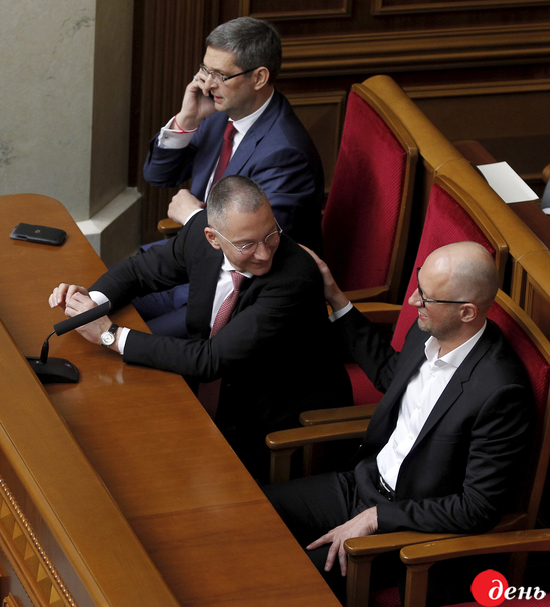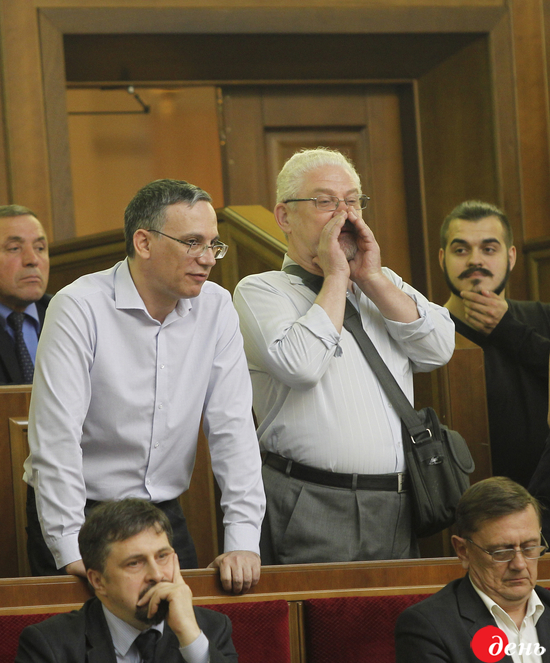The Presidential Administration finally pressurized MPs into passing amendments to the Constitution related to the justice system on June 2 by 335 votes. Faction-wise, the “heroes” are as follows: Petro Poroshenko Bloc (PPB) – 138 MPs, People’s Front – 80, Opposition Bloc – 38, Radical Party – 1, Fatherland – 13, Renaissance – 22, People’s Will – 18, and independents – 25. None of the Samopomich MPs voted for the law. This looks like a sheer idyll between the “Maidan-raised” deputies, on the one hand, and the former Regionnaires and their satellites, on the other.
“Undoubtedly, it is a certain compromise but also a serious step forward,” the PPB’s Anatolii Matviienko comments to The Day. “There are enough ‘safety devices’ there. After all, we must really clean up the judiciary. Some MPs refused to vote in protest against a too high salary of judges – as high as that of National Anticorruption Bureau (NABU) officials. Their salary will in fact exceed that of their counterparts in Poland which has a higher per capita GDP. But if we want to prevent corruption, this decision is a must, even though it is not the main guarantee. Anyway, the system of declarations will make it possible to closely monitor the incomes and expenses of judges.”

THE PRESIDENT’S SUPPORT GROUP: CHIEF OF THE PRESIDENTIAL ADMINISTRATION BORYS LOZHKIN, HIS DEPUTY VITALII KOVALCHUK, AND… ARSENII YATSENIUK. ALTHOUGH “THE PRESIDENT’S MEN” HAD DISMISSED THE LATTER FROM THE OFFICE OF PREMIER, HE WAS IN A GOOD MOOD
President Petro Poroshenko personally came to parliament to persuade MPs to vote for constitutional changes. The Cabinet was also present in a body. Poroshenko displayed sporting zeal in his speech. According to the head of state, this is a true reform which “will let Ukrainians regain the right to the truth.” He also said that holy fathers had given him their blessings to do so and Western partners, too, had called for introducing changes to the Fundamental Law.

THIS PARLIAMENT CAN DO EVERYTHING
“What is at risk today due to scandals and corruption in this country is Ukraine’s association with the EU, visa-free treatment, and extension of sanctions against Russia,” a Fatherland MP, who stubbornly insisted on anonymity, said to The Day. “So we must show the West certain reformatory steps, such as judicial reform. These reforms are expected first of all to touch upon courts because this is the basic thing that guarantees punishment for corruption. The West is tired of scandals in Ukraine. And it is, of course, cynical on the part of the Presidential Administration to manipulate and take advantage of this situation in order to increase the head of state’s powers and influence on judges, as it also was when they railroaded the appointment of ‘their own’ prosecutor general.”

VIKTOR SHYSHKIN TRIED TO CRY OUT FOR UNDERSTANDING
The current leadership itself is first of all to blame for a situation when foreign forces are compelling it to alter the country’s Constitution. A glaring example is the Minsk Agreements which enabled the Kremlin to lure official Kyiv into a trap and convince the West to follow this way. As for the absence of corruption control in Ukraine, its American and European partners have been saying this openly for a long time now, but this country has taken no real steps in this direction. Instead, we have an offshore scandal. “To eradicate corruption, we are introducing such thing as uniformity of judicial practice,” People’s Front MP Leonid Yemets comments to The Day. “So a Supreme Court plenary session will also exercise judicial practice for various disputes – as a result, the number of judicial litigations will drop drastically in 5-6 years’ time. We corroborate this with other procedures: we are abolishing the high administrative, economic, and specialized courts as vestiges of the Kuchma and Yanukovych regimes, when the authorities used them to oversee judicial trials. All the Supreme Court judges are being dismissed, and new people are being recruited by way of competition. These people may be not only judges, but also lawyers and university teachers with an employment record of at least 10 years. We are introducing the Anticorruption Court to handle the NABU-related cases.”
Incidentally, on Thursday morning MPs managed to adopt in the first reading the law on the court system and the status of judges, which is closely tied to Constitutional changes. “This law will help solve acute problems and pave the way for honest and fair judges,” Yemets says.

THE PEOPLE’S WILL GROUP CAN ALWAYS FEEL THE VIBES. NO WONDER IT IS ONE OF THOSE WHO BENEFITED THE MOST FROM THE EUROMAIDAN
“There are a few very nice adages and attractive stories, but, much to our regret, some things disguised as these adages will be devaluing the Fundamental Law,” the Samopomich faction’s Oleh Bereziuk said in his speech. “Yes, judges can, I underline, can be dismissed. But who will be recruiting them? There will be a complete monopolization of judge recruitment in the next two or three years. Some judges will not even go through this. Next is monopolization of advocacy in this country. There is a totally unclear adage about the role of the prosecution service that will be organizing trials. There are many other things that reduce the value of this country’s Fundamental Law which must not have dual interpretations and functions. Oligarchs may take advantage of this and finally cement their regime under the guise of good intentions.”
“These changes upset the balance of the separation of powers now enshrined in the Constitution,” Mykola Siry, Candidate of Sciences (Law), senior fellow at the Koretsky Institute of the State and Law, emphasized in our previous article “Who are they to judge it?” (No.35, June 2, 2016). “If we speak about independence of the judicial power, this means that parliament has no right to restrict the competence of judges. In other words, the entire judicial branch must belong to the system of justice, whereas the proposed changes allow parliament to measure out the competence of a court. Besides, the proposed procedure of appointing judges (they will be selected by the High Board of Justice and confirmed in office by the head of state) in fact means that the judicial branch will be subordinate to the president’s power.”
The details of the constitutional changes are, of course, of great importance, and they will be further analyzed, but the gravest problem is different, which Viktor Shyshkin, a Constitutional Court judge in 2006-15, has repeatedly emphasized. “Above all, to push through these changes, the president rode roughshod over MPs again – it is about the quality of parliamentarianism in a parliamentary-presidential republic,” Shyshkin says to The Day. “An MP told me personally about the way they ‘worked’ with deputies, also making use of the Party of Region’s slush fund. Now about the main thing. Changes to the Constitution is collaborationism, it is an attempt to help Putin whitewash himself on the international arena. Our leadership is really playing into his hands in this case. Firstly, the president has failed to perform his constitutional duty – he did not impose martial law when a foreign state’s troops invaded our territory, which at the same time gives the head of state legal grounds to order mobilization (Item 20, Article 106 of the Constitution). Secondly, if we are not in a state of war, why are there front-line battles that involve tanks, artillery, and the air force, and claim thousands of human lives, why are there millions of refugees? And the Constitution cannot be amended in the conditions of martial law (Part 2, Article 157). I stress it again: in the conditions, not after imposition, of martial law. And it is not only a pure theory of law but Ukraine’s foreign-policy catastrophe. We are thus confirming that Putin, who keeps on saying that we have a ‘civil war,’ has committed no aggression. In other words, not only has the president in fact subjugated the judicial branch, but we have also played up to Putin, showing that we have a ‘domestic conflict.’”
The vote in parliament demonstrated that there is in fact no real opposition there. As practice shows, the refusal of two factions to vote may have been caused not so much by ideological reasons as by the absence of certain agreements on other matters. And those who voted “for” and put down their decision to a necessary compromise or external pressure are in reality helping the president to build a vertical chain of power, thus establishing a wrong reference frame. The only question is what for. Clearly, not for the sake of reforms so far… The essence of constitutional changes is not in pushing them through at any cost but, above all, in legal culture.







